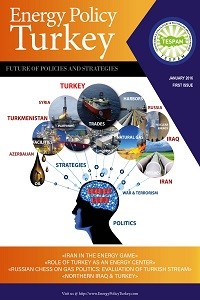Öz
Kaynakça
- U.S. Energy Information Administration, “International Energy Data and Analysis”, 2015. U.S. Energy Information Administration, “Country Report: The Middle East”, 2015. BP Statistical Review of World Energy 2014, “Excel Workbook of Historical Data”, 2014. IHS Energy, “IHS GEPS Reports – The Middle East”, July 2015.
Öz
It all started in Tunisia on 18 December 2010 and reordered many
countries in the Arabic Geography. Whereas some governments could not manage
the upheaval and collapsed, some others had to face heavy civil disorder-protests
and occurrences of necessary governmental reorganizations.
Many experts have studied and further analyzed the whole aspects of this
Arab Spring by the sight of economics, military, sociology, religion and global
politics. Obviously, there are definite changes in reorders of those affected
countries and so their presence in the globe requires new policies. As a short
note, today’s world largely depends on energy politics because they seem to
play a key role in determining global policies. From a point of view, it is
unclear why nobody has yet reviewed results of the Arab Spring through the sight
of energy policies. It is a good idea to note that if not all, most of these
countries are definitely oil producers and their folks crave for democracy,
which indeed has taken too many lives to owe. Was it worth taking the
initiative and walking the democracy line with heavy loses and uncertain future
due to lack of knowledge and control over militia groups? Maybe, those folks
had no idea about the outcome but the West knew about how hard the transition would
be. Major oil companies like to have the edge to act independently or run their
international affairs as smooth as possible. They would prefer surpassing
governments and their laws to extract and sell oil from known commercial
reserves. Or perhaps, their preference would be causing some changes that are
essential as far as who controls the laws or the oil markets in such countries.
Understanding the causes of the Arab Spring, the
outcome of collapses, rebuilding and highlighting the effective changes in energy
politics, balance and role of key oil players in Africa and Middle East will help
determine how global politics have been reshaped over Arabic upheaval. To do
that, all current import and export rates of the due countries, existing reserves,
production and infrastructure of exports, international investors and companies
in the region and important projects will be considered. In addition, pre-Arab
Spring Era situations will be compared with the current values and changes in
energy games will be identified.
Anahtar Kelimeler
Kaynakça
- U.S. Energy Information Administration, “International Energy Data and Analysis”, 2015. U.S. Energy Information Administration, “Country Report: The Middle East”, 2015. BP Statistical Review of World Energy 2014, “Excel Workbook of Historical Data”, 2014. IHS Energy, “IHS GEPS Reports – The Middle East”, July 2015.
Ayrıntılar
| Konular | Ekonomi |
|---|---|
| Bölüm | Makaleler |
| Yazarlar | |
| Yayımlanma Tarihi | 30 Ocak 2016 |
| Yayımlandığı Sayı | Yıl 2016 Sayı: 1 |
Kaynak Göster
Energy Policy Turkey is a Trade Mark of TESPAM


